Today, it is possible to divide a household's energy expenses, representing between 62 and 67% of the energy bill, by 3 or 4 by installing a heat pump. Its operating principle is simple: after drawing calories from the outside air, the device releases the heat inside your home or in the water of your pool to heat them. Air-to-air, air-to-water or reversible? Discover our selection of the best heat pumps.
Here is our commitment, to make sure that we provide the best user experience and content quality:
You can support us by using our links to make your purchases (at no extra cost to you)! This sometimes earns us a commission which allows us to remain independent. More about us
Our selection
"The Bosch Compress 3000 AWS is not just a heat pump. In this split version, it is incredibly robust. In addition, it will reduce your…"
"It is a heat pump specially designed for above-ground pools with a maximum volume of 20 m³. With such a device, enjoying your pool all…"
"It's certain that you'll be the envy of many with a heat pump like this one! It can operate in heating mode only or in…"
"One of the most economical of this comparison, the Hayward Eco PAC Powerline 11 kW can heat a 75 m³ pool. It remains functional even…"
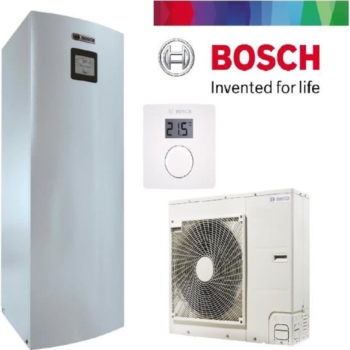
The Bosch Compress 3000 AWS is not just a heat pump. In this split version, it is incredibly robust. In addition, it will reduce your energy consumption over the year.
4 576 £ on CdiscountThe Bosch Compress 3000 AWS will make you use less energy. In addition to the indoor and outdoor units, the package includes a Bosch CR10 room thermostat. And what about its longer service life compared to other models in the same range? This is largely due to its design quality and its modulating technology (Inverter). This split heat pump emits very little noise, so you don't have to worry about its location.
Good to know, the Bosch Compress 3000 AWS is not afraid of the cold. Its operating temperature goes down to -20°C. This heat pump also has an electric booster to compensate for the loss of energy in the event of very low outdoor temperatures. If you are often away, use the remote control via a smartphone or tablet. It is important to specify that 4 heating circuits can be connected simultaneously to your heat pump.
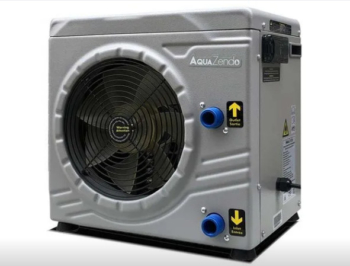
It is a heat pump specially designed for above-ground pools with a maximum volume of 20 m³. With such a device, enjoying your pool all year round is no longer a dream.
320 £ on ManomanoMeasuring only 40 x 30 x 40 cm, the AquaZendo Aqua Premium pool heat pump weighs 20 kg. If you place it 1 m away from your living areas, it will produce a sound pressure of about 46 dB, the same as a normal human voice. At a distance of 10 m, this sound volume decreases to 36 dB. Its water flow rate of 3 m³/h is very satisfactory. As the heat pump uses R32 refrigerant, its energy performance is significantly improved.
We appreciate its operating temperature ranging from 15 to 26 °C, its Exceptional COP of 4.6 to 6 or its considerable power of 3 kW. The AquaZendo Aqua Premium has a rotary compressor and a PVC tank with a titanium coil. It comes with 2 hose connectors, 2 hose clamps, 1 DDR/RCD plug and a 2 year warranty.
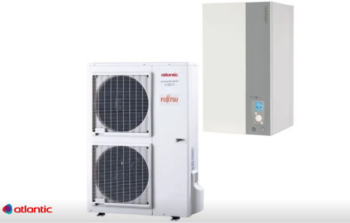
It's certain that you'll be the envy of many with a heat pump like this one! It can operate in heating mode only or in heating + DHW (domestic hot water) mode with a power of 11 kW.
7 158 £ on ManomanoConsidered one of the best heat pumps of the moment, the Atlantic Alfea Excellia A.I. 11 has many advantages. Apart from its reliable hydraulic design, this heat pump is equipped with an Atlantic patented coaxial exchanger and a low consumption circulator. Of course, we can't forget to mention the optimal insulation and the robustness of the heat pump's parts. Note also that the Fujitsu external module has been optimized. Thus, the heat pump will be able to adapt to the variation of the outside temperature, even the most extreme.
This outdoor unit is accompanied by a hydraulic indoor module that guarantees two main functions, including heating only or heating + DHW. It incorporates a Navistem 400S interface, which will simplify the handling of the unit. The Easy Start feature gives you the ability to perform a quick and easy self-parameterization. Compatible with the CozyTouch app, the device is easily controlled remotely.
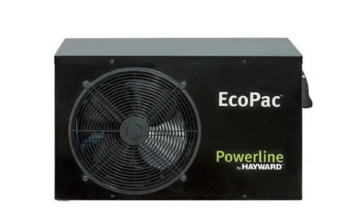
One of the most economical of this comparison, the Hayward Eco PAC Powerline 11 kW can heat a 75 m³ pool. It remains functional even at an ambient temperature of 7°C.
975 £ on ManomanoThe Hayward Eco PAC Powerline 11 kW is characterized by its galvanized steel body. This robust structure ensures that the pool heat pump is optimally resistant to the sun and corrosion. In addition to its perfect compatibility with salt electrolysis, it is also composed of top-quality components that guarantee a very good COP.
Note that the Hayward Eco PAC Powerline 11 kW has a titanium exchanger and works with R410A refrigerant gas. In addition, its rotary compressor is silent with a noise level of 42.7 dB. Its fan turns at a nominal speed of 850 RPM, which is already very high for a COP of 4.45. On the front, you will find an intuitive control panel with an LCD screen that gives you full control of the heat pump.
Any specific needs?
The best entry-level heat pump
Your guide :
Rate this buying guide :By rating this buying guide, you are helping us to reward our best writers. Thank you!
| THE BEST | CHEAP | TOP OF THE LINE | EXCELLENT | |

In accordance with our commitment, this buying guide does not contain any sponsored products. |
 9/10 |
 7/10 |
 9/10 |
 8/10 |
| OUR SELECTION |
Bosch Compress 3000 AWS
|
AquaZendo Aqua Premium
|
Atlantic Alfea Excellia A.I. 11
|
Hayward Eco PAC Powerline 11 kW
|
|
The Bosch Compress 3000 AWS is not just a heat pump. In this split version, it is incredibly robust. In addition, it will reduce your energy consumption over the year.
|
It is a heat pump specially designed for above-ground pools with a maximum volume of 20 m³. With such a device, enjoying your pool all year round is no longer a dream.
|
It's certain that you'll be the envy of many with a heat pump like this one! It can operate in heating mode only or in heating + DHW (domestic hot water) mode with a power of 11 kW.
|
One of the most economical of this comparison, the Hayward Eco PAC Powerline 11 kW can heat a 75 m³ pool. It remains functional even at an ambient temperature of 7°C.
|
|
|
Type
|
Split air/water heat pump
|
Air-to-water heat pump
|
Reversible air/water bi-block heat pump
|
Air-to-water heat pump
|
|
Power
|
7 kW
|
2942 W
|
11 kW
|
10 600 W
|
|
Refrigerant gas
|
R410A - R32/R125 (50/50)
|
R32
|
R410A - R32/R125 (50/50)
|
R410A
|
|
Sound level
|
-
|
36 to 46 dB
|
46 - 69 dB
|
42,7 dB
|
|
COP
|
4,8
|
4.6 to 6
|
4,25
|
4,45
|
Help us improve this table:
Report an error, request the addition of a feature to the table, or suggest another product. Thank you for your kindness!
We spend thousands of hours each year studying the major specialized websites, analyzing products of hundreds of brands and reading user feedback to advise you on the best products.
We are a product review company with a single mission: to simplify your buying decisions. Our research and testing helps millions of people every year find the best products for their personal needs and budget.
To support us you can: use our links to make your purchases (which often earns us a small commission), share our articles on social networks, or recommend our site on your blog. Thanks in advance for your support!
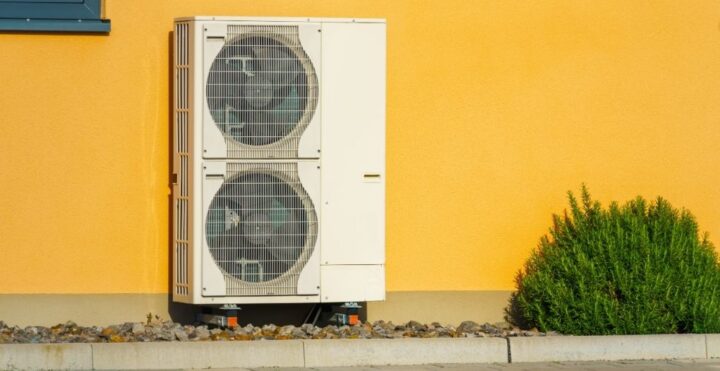
In order for your heat pump to exactly match your heating needs, it is necessary to choose the right power. An overpowered heat pump will unnecessarily increase your energy costs, and its compressor will wear out faster because of frequent start/stop cycles. On the other hand, an underpowered heat pump will not heat your home properly. In any case, you can seek the services of an energy supplier or other online organization to estimate the necessary power of your heat pump, taking into account the characteristics of your home.You can estimate the heating power and the cooling power if your heat pump offers the air conditioning function.
Fundamental criterion in the choice of a heat pump, the coefficient of performance or COP corresponds to the ratio between the electrical consumption of the device and the amount of heat it is capable of providing. The COP must be at least 3.4 to save energy. A COP of 4, for example, means that the heat pump consumes 1,000 W of electricity to produce 4,000 W of heat.
As with electrically powered household appliances and indoor comfort devices, a heat pump also carries an energy label that determines its level of electricity consumption. The highest label, class A+++, corresponds to the most energy-efficient appliances. As a rule of thumb, heat pumps with high coefficients of performance carry an A, A+, A++ or A+++ energy label.
Determine in
advance how you will use your heat pump. If you want to replace your current boiler with a more energy-efficient heat pump, a conventional air-to-water model is ideal. But if you want to use the same equipment to cool your home in the summer, a heat pump with air conditioning function is recommended.
There are three main types of heat pumps depending on their technology: air - air, air - water and ground - water or geothermal. An air-to-air heat pump draws the calories present in the air, to transform them into heat which is used to heat the air injected in the house. An air - water heat pump takes the calories from the ambient air and uses them to heat either domestic water or a heat transfer fluid, or both at the same time. A PAC soil - water, finally, draws calories in the soil to heat the water and/or heating.
A heat pump uses a renewable and clean resource: calories from the air, water or soil. Its operation includes several steps:
For geothermal and hydrothermal heat pumps, the calories are collected via a network of sensors buried in the ground, or introduced into the water table.
The different configurations of heat pump
A monobloc heat pump consists of a single module placed outside, which includes the hydraulic module and the compressor. The unit is connected directly to the heating water circuit, as well as to the domestic hot water circuit if the heat pump offers this feature.
A split-system heat pump consists of an outdoor module that houses the air intake fan and the compressor, and a large hydraulic module for storing domestic hot water. The two elements are connected by specific ducts, and the hydraulic module is connected to the hot water and heating network.
The efficiency of a heat pump decreases if the outdoor conditions are not met. If you live in a very cold or hot area, check to see if the local temperatures are suitable for your heat pump. It will consume more energy if temperatures are too low or too high. It could also simply be inefficient.
Three main types of heat pumps exist: the aerothermal heat pump, the geothermal heat pump and the hydrothermal heat pump. They differ by their heat extraction technology.
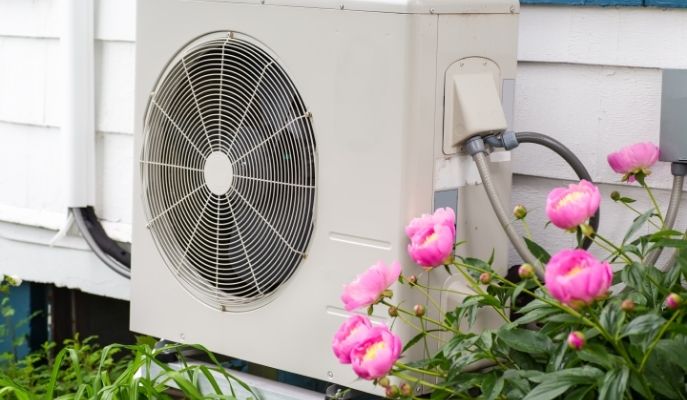
The aerothermal heat pump includes the most common air-to-air and air-to-water heat pumps. Its mode of operation is to take the calories present in the ambient air
to produce heat. This heat is then used to heat the air in the case of an air-to-air heat pump/air conditioner. The hot air produced is introduced into the room to be heated by convection. In the case of an air-to-water heat pump, the heat is used to heat the water in an existing heating circuit that includes water radiators and/or underfloor heating.
If the aerothermal heat pump has the advantage of being ecological and economical, it has the disadvantage of being dependent on the outside temperature. It is simply not recommended in a cold region where temperatures often drop below 0°C. An aerothermal heat pump often comes as a complement to central heating or other types of auxiliary heating.
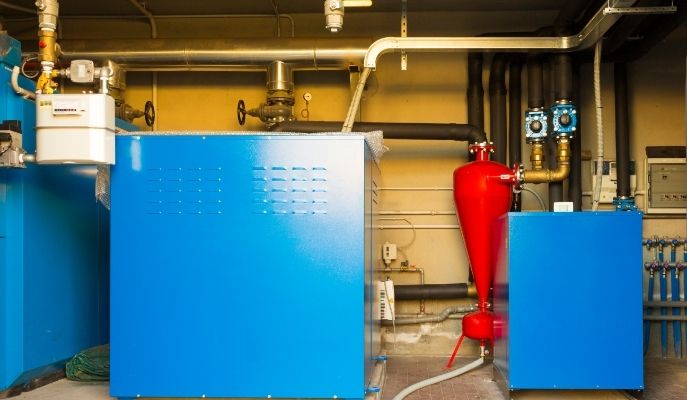
The
geothermal heat pump draws the calories retained in the ground
in order to use them to produce heat and heat the water of a heating circuit. It includes collectors, which are essential for the collection of calories. They must be buried either horizontally or vertically, therefore deeper. The major advantage of a geothermal heat pump is its ability to ensure the heating of a house in an autonomous way, without recourse to a boiler. It can also ensure the production of domestic hot water.
Nevertheless, its installation requires heavy and expensive work. Moreover, it is necessary to obtain an authorization delivered by the municipality to install a geothermal heat pump.
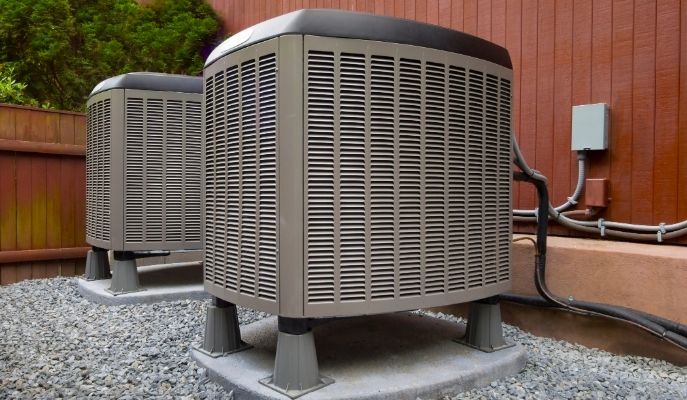
Little
widespread, the hydrothermal heat pump uses the calories of the water table to produce heat
that will feed the circuit of a central heating. If its operation is common with the other types of PAC, the mode of collection differs from them. The specific collectors are deeply buried in the ground to reach the water table. Nevertheless, a hydrothermal heat pump can only supply a heating circuit at low temperature, and therefore can not be used for the production of domestic hot water.
As for the geothermal heat pump, the hydrothermal heat pump requires significant installation work that also makes it expensive. In particular, it is necessary to perform a deep drilling. In addition, it is conditioned by the presence of a water table or a water source.
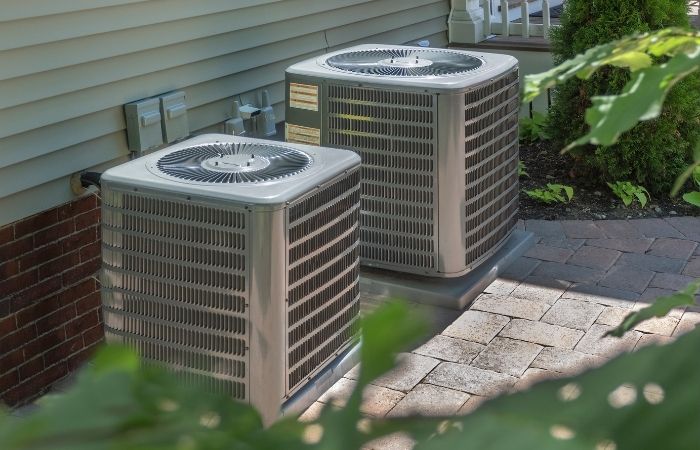
To take advantage of energy savings
A heat pump has a very low electricity consumption. In fact, the energy released into the home comes mainly from the outside air, which means that you won't have to spend any money, as it operates on a natural resource. If your insulation is correct, you will make substantial savings. But there are also heat pumps that use energy from the ground. The advantage is that you will have a constant heating solution, and of course, this will have little impact on your electricity bill.
For its dual use
Heat pumps are not limited to providing heating. In fact, they are generally reversible. When the weather is hotter, you can use it as an air conditioner to keep your home cool. When the weather turns bad, you will have all the heat you need in all the rooms of your house.
For its comfort of use
A heat pump does not take long to produce heat. It heats up almost instantly. In addition, you will enjoy sound comfort since it works without making deafening noises. Lastly, you will appreciate its autonomy as there is no need for additional heating.
For its technologies
With recent models of heat pump, you have the possibility of remote control. For example, you can select the desired temperature. An adjustment is also possible according to the occupation of the spaces in your home. Moreover, the heat pump adapts to all types of construction.
To limit any environmental impact
By drawing energy from the inexhaustible outside air, a heat pump limits the impact on the environment. It emits a reduced amount of carbon dioxide compared to conventional heating. By using it, you contribute to the respect of the environment.
In our opinion, the best brands of heat pumps in 2022 are :
It is a Japanese brand founded in 1870 in Tokyo. It is best known as a car manufacturer. But it also has an excellent reputation in the field of industrial and other appliances. It is a leading brand known all over the world. Its products are of high quality and they are known for their longevity. It is 100% reliable.
Created in 2005, this German brand belongs to the Chal-Tec group based in Berlin. The brand is mostly known for its very good quality home appliances and it has a wide range of them. Despite its relative youth, Klarstein has an excellent reputation. Its products are reliable.
Daikin is a Japanese brand that was born in 1924. Specialized in air conditioning and refrigeration systems. Today, it is one of the world's largest manufacturers of air conditioning products and refrigeration systems. The brand offers a wide range of products that will suit all budgets.
De Dietrich is a French group specialized in the design, development and distribution of high-performance technical comfort solutions. Whether for individuals or for companies, by the way: De Dietrich is very famous, especially in the pharmaceutical and chemical industry. This shows how efficient and reliable its products are.
Saunier Duval is a leading French brand in the field of heating technology. It has been manufacturing reliable products for over 100 years, products that have one main attribute in common: the ability to prove their excellence, day after day.
The diagram below will help you to get an idea of the typical prices for each price range (entry-level, mid-range and high-end).
However, more expensive does not necessarily mean better.
We therefore advise you to always consult our ranking before deciding, rather than blindly relying on price ranges.
Clean and replace the air filter regularly
To keep it efficient and effective, you should clean the air filter on your PAC regularly. Some models can automatically alert you to the need to change the filter.
Determine your heating needs in advance
An
oversized heat pump that produces more heat than you need will use more energy unnecessarily. On the other hand, if it's undersized, it won't be able to adequately provide your heating in winter. Use an online tool or get help from a professional to determine how much heating power you need.
Avoid using the built-in space heater
Only turn on the electric space heater when necessary, such as when outdoor temperatures drop very low. If you leave the auxiliary heat on, your heat pump may use a lot of electricity.
Find out about energy conversion grants
Don
't forget to ask about possible government assistance for installing your heat pump. Depending on the case, different forms of aid are available, such as the tax credit for energy transition or CITE.
Have your heat pump installed by a certified professional
You
must use a certified installer to install your heat pump. In addition to ensuring your safety, using a qualified professional makes it easier for you to access state aid.
The best heat pump depends on your needs and your budget. Read our buying guide to find out which products are the best at the moment.
An entry-level heat pump costs around 2,000 euros. A mid-range model sells for between €2,500 and €5,000. The price of a top-of-the-range heat pump can range from €5,500 to €12,000.
Yes, a heat pump can be noisy. That is why it is advisable to check the noise level of each model, expressed in decibels.
An air-to-air heat pump distributes heat via a forced-air system that passes through an indoor convector. An air-to-water heat pump uses the conventional heating network to distribute the heat.
As a heat pump is often heavy, wall mounting is not possible. Simply place the heat pump on the ground and fix it securely to a solid support.
Every month we help more than 1 000 000 people buy better and smarter.
Copyright © 2022 - Made with ♥ by buyingbetter.co.uk
Your reviews and buying guides 0% advertising, 100% independent!